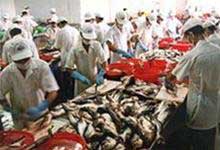The fatty waste from catfish and basa fish in the Mekong Delta region can be converted into biodiesel. This is the research project conducted by staff at the Institute of Materials Science in Ho Chi Minh City, part of the Vietnam Academy of Science and Technology.
 |
|
Catfish and basa fish fat can be processed into biodiesel |
Biodiesel, also known as bio-diesel, refers to a type of fuel used in diesel engines, made from vegetable oils or pure methyl esters derived from vegetable oils or animal fats. Historically, vegetable oils were used as fuel for engines in the early 1900s. However, at that time, the need for cheap oil energy had not yet become critical. As fuel prices increased and the risk of fuel shortages grew, the search for alternative sources became essential.
In 2004, the Institute of Materials Science in Ho Chi Minh City successfully researched the technology to produce biodiesel from animal and vegetable fats. The research team led by Dr. Nguyen Dinh Thanh “launched” the technology for producing biodiesel from waste oils and basa fish fat. Dr. Thanh explained that fats are triglycerides of glycerol and various fatty acids. There are many methods to synthesize biodiesel, but the method of transesterifying vegetable oil fats using zeolite catalysts with methanol (or ethanol) is considered the best.
The raw materials, along with the catalyst and methanol, undergo a reaction process lasting 4-6 hours, resulting in both solid and liquid components. For the liquid portion, after recovering the excess methanol, two useful substances are separated: glycerin (used in cosmetics formulation) and biodiesel. Through this separation method, one ton of raw material can yield 100 kg of glycerin and 800 kg of biodiesel. The standards for flash point and viscosity of the product meet the required specifications, and the cost of biodiesel is approximately 20% lower than that of diesel fuel in the market.
A notable feature of biodiesel from fish fat is its ability to burn cleanly and emit very few harmful pollutants into the environment, such as sulfur oxides and hydrocarbons. Research has shown that using biodiesel reduces soot emissions by one-third compared to traditional diesel fuel. Additionally, there is no need for additives to increase the octane rating, and the high boiling point is advantageous for long-term storage.
Dr. Thanh mentioned that this technology has been successfully developed in the laboratory. A basa and catfish processing enterprise in An Giang Province is negotiating to build a large-scale factory to help address the significant amount of basa fish fat produced in the area.


















































